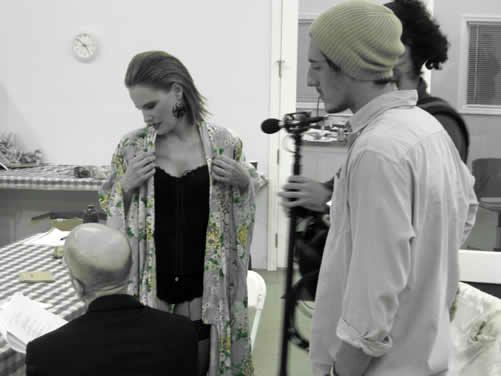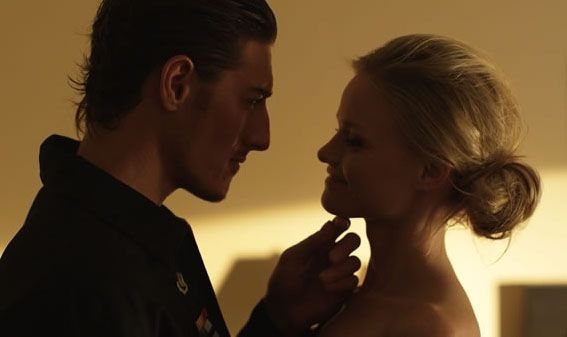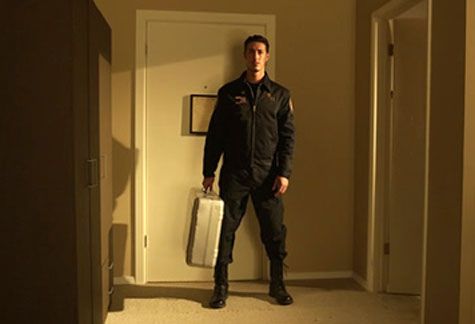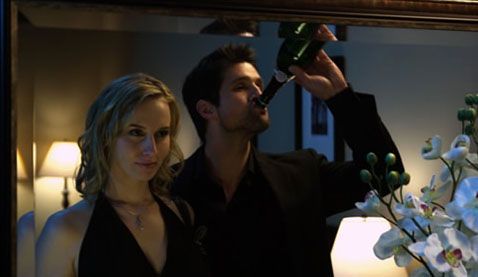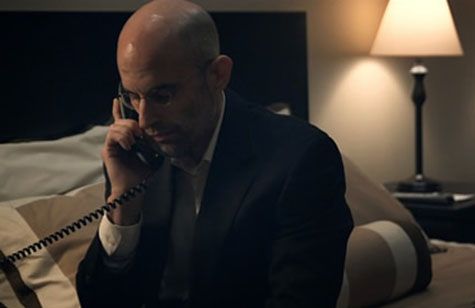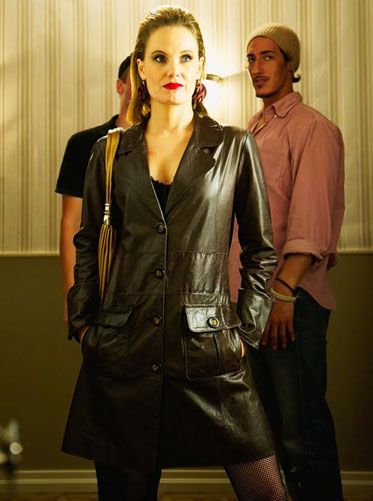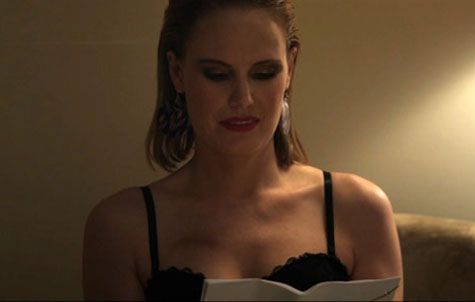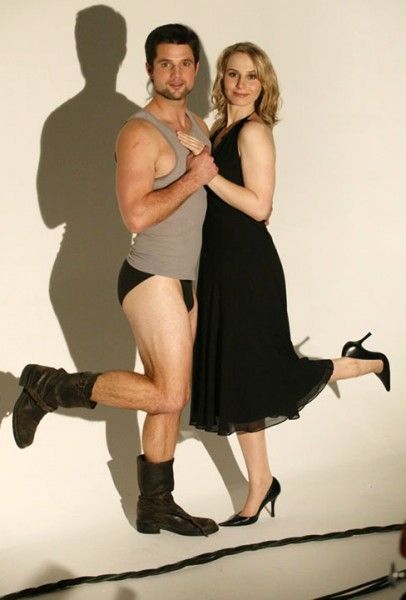In the independent feature Do Not Disturb, five directors took on five short stories, all tied together in one dark, humorous film about what goes on behind the door of hotel room 316, and the maid who connects all of the stories together. Actor Eric Balfour, who appears in the segment entitled “Rocketman” opposite True Blood star Lindsay Pulsipher, makes his feature directorial debut with the film’s first segment, “Duccio’s Madonna,” a dark drama about a lonely man (Harris Goldberg) that pushes a hooker (Maureen Flannigan) too far, only to find an eager maid (Diva Zappa) happy to help him finish the job. With little time for preparation, each director was given a brief synopsis and one day on set to tell their story, all of which was overseen by producer Mali Elfman (who also appears in two of the film’s segments), giving it a truly collaborative feel. All the details on how to watch the film are here: http://dndthemovie.com/Watch.html .
During this exclusive phone interview with Collider, Eric Balfour talked about how he got involved with Do Not Disturb, what he enjoys about working with Mali Elfman, what the work he’s done as an actor has taught him about directing, what he’s learned from this experience, and how he’s looking forward to taking on full-length features in the future. He also talked about returning for his SyFy series Haven, and how he’s excited for viewers to see what they’re doing for Season 2. Check out what he had to say after the jump:
Since doing this interview, Eric Balfour announced that he will be making his feature film debut with a screenplay based off the Jesus Hates Zombies graphic novel by Stephen Lindsay, that was written for the screen by Michael Mongillo and Jason Alan Smith and is set to be produced by the writing duo, along with Mali Elfman and Derek Zahler.
Statement from Eric Balfour:
“It’s an honor to be a part of this project. It’s bold, unapologetic and controversial. When I read the script, I was blown away by how well the writers had given life to Stephen’s graphic novel. What most intrigued me about the project was its heart and message. There is plenty of comedy and action in the script, but what I wasn’t expecting and am most excited about bringing to the screen is its message of love and faith. I love when a script can break the mold and offer something unique and I’m going to work my ass off to honor Michael and Jason’s great script, and Stephen’s fantastically unique world. The way I see it, Jesus was a bad-ass and a revolutionary. Who better to save humanity from the zombie apocalypse than JC?”
Question: How did this come about for you?
ERIC BALFOUR: They came to me to act in one of the segments, and when I read the synopsis of what this whole thing was and how they were doing it, it was one of those instances of, “Oh, wait, there may be an opportunity for me here to do this.” I’ve spent the last couple of years, more and more, working on being a director. I sold a show to Fox Television Studios and they gave me a budget to shoot and direct some episodes of that, and I really enjoyed it. Directing is something that I’d been wanting and hoping to do, as I’ve grown into myself. So, I said, “I would be interested in coming out and lending my services as an actor, if there was an opportunity where I could direct one of the segments.” And Mali said, “There happens to be one of the stories that doesn’t have a director. Let me send it to you and see what you think.” And, I read it and just thought it was really odd and funny and tragic and dark. I immediately had a really clear vision for how I could do that, and I told her what I would want to do and how I would want to do it. I’ve gotta hand it to Mali. She took absolutely no money and just said, “Let’s go make something. Let’s create something.” And, she pulled it off. It’s really awesome.
What was it like to collaborate with her, throughout this entire project?
BALFOUR: She, like me, is a very passionate, excited person when it comes to creating stuff. One of the coolest things that came out of doing this together was that we built this relationship and are now actually working on developing some other projects together. I really love working with her. This is a business full of bullshitters, who talk a lot of shit and don’t get shit done. I love that Mali says she wants to do something, and that doesn’t mean it’s going to happen, but she will actually do everything she can to make it happen and I love being around people like that. It was just a great opportunity for me. Every little opportunity and chance that I get to be on a set, to be a director, to utilize the skill sets that I already have and to learn what I don’t know, and to see how I can improve upon that is just a really great opportunity for me. Ultimately, I want to spend a lot more time directing.
What do you enjoy about directing, apart from what you do as an actor?
BALFOUR: Although there’s an immediate gratification that comes from being in front of the camera, for obvious reasons. People go see a movie or they watch a TV show and they see you. You get the immediate, “Oh, I saw you on TV,” or “I saw you in a movie.” A lot of why we become actors is to fill a void that we have and a part of that void is to live out and tell stories that we’ve lived or that we hope would have been different in our own lives. Also, part of it is just to feel a need, in a lot of us, to feel that gratification and to be validated. It’s strange because the exact thing that is the most difficult part of our business and the most damaging to the soul is the amount of rejection there is. Dealing with that rejection is the most painful and apparent part of what we do, as actors.
As you get older and you hopefully battle your own demons, you find other reasons why you want to be an actor. The people that I truly admire do this because they love telling stories and they love the make-believe of the moment, and not so much the gratification afterwards. That’s where becoming a director really started to make sense for me. The gratification you get is so much more complete because you’re sheparding the story from beginning to middle to end, and you’re part of the entire creative landscape of it.
As an actor, most of the time, you only have so much say in how, what and where things go. As a director, you really get to paint a bigger picture. You have many more brushes to use. Although you don’t get that immediate gratification of being in front of an audience, the satisfaction is far more interesting and complete, in my experience thus far. I already love acting and I love actors, so being able to communicate with actors and to bring performances out of them, and to tell a story and aid them, is really exciting for me.
What has your experience as an actor taught you about directing?
BALFOUR: One of the greatest things I’ve learned, as an actor, was how to talk to actors. As most actors will tell you, we’ve had lots of experiences with people not knowing how to talk to actors and, in a lot of ways, not being careful or kind with how they relay information to actors. You’re talking about someone’s art and creativity and, at times, I think directors can be a little insensitive to how vulnerable an actor is, when he’s giving a performance. Part of the job of an actor is to invite scrutiny, but with that, the people around them have to nurture that and put them in an environment where they feel safe and they feel like they can risk something. That’s when you see these great performances. At a certain level, great actors who are successful actors don’t have to worry about it. They can just go for it because they believe in themselves. That’s where you see the performances that somebody like Meryl Streep or Daniel Day-Lewis can give you. What you want to do is put actors in a space where they feel very comfortable and confident to try something and explore something.
I’ve literally had directors say to me, “What are you doing?,” and they give you this quizzical look, like you did something wrong. And then, all of a sudden, you become very insular and closed off. What we’re trying to create are these heightened moments of reality. If you’re able to convey that truthfully, you have to feel safe to go for it and to fall on your face. You’ll never get to that next level unless you’re unafraid of falling or looking silly. If you’re afraid of how people are going to judge you – especially with the crew and the producers and directors around you – you’re not going to really go for it and you’re never really going to achieve greatness.
Was it easier to direct a segment of something first, instead of directing a full-length feature?
BALFOUR: No, it was actually harder because I was bound by the rules of all the other stories, my time was limited, and I was having to share equipment and sets. As collaborative as filmmaking is, this was a whole other level of collaboration. It would be easier if you were the sole director and, from the beginning, you could say, “This is how we’re going to go.” I had to walk into a space and go, “Well, I wanted it to be this, but it’s just not going to be, so I have to make this work for what is available and what is in context.”
How involved was Mali, throughout this entire process?
BALFOUR: I’ll be honest, Mali does an absolutely fantastic job of being a producer. She was always there to nurture and oversee everything, but she never took away from your position as the director. She was always very conscious and respectful of your role, so I never felt that from her, although she was always there to answer questions. This is a collaborative medium, but unless it was a rule that was established about the entirety of the film, she really deferred to your decisions and your belief, as the director, for the vision that you wanted to portray.
Were you ever worried that you wouldn’t be able to get your whole segment done in one day?
BALFOUR: Absolutely! As an actor, I’ve always paid attention on sets. I’ve always watched, learned and listened, and you start to see things differently. You always leave yourself an out. You always know, “I want to get this, but if I don’t, I know if I get this, this and this, I’ll be okay,” and so, the ability to think quick on your feet, to adjust and to be malleable is really important. We had our roadblocks. The very first scene of the day, the cameras weren’t working, and I only had a 12-hour day, so I spent four hours of my day just trying to get the cameras working. What should have been a 12-hour day of shooting turned into an 8-hour day of shooting. I just knew, “I can abandon this, this and this, but if I get this, this and this, I’m going to be able to get in the editing room and create the thing that I want.”
Did you get to collaborate with the writer of your segment (Christie Ko) at all?
BALFOUR: I was allowed to work on the script and do a little bit of rewriting on it, to adjust it to me, but it was really well written, so I didn’t have to do a lot of work on it.
What attracted you to the “Duccios Madonna” segment?
BALFOUR: The stories that I like to tell and the movies I like are always grounded in the emotional arc of the characters. That was probably why I was so excited when I read the script. I was fascinated by the journey that this john had to go on – this attrition that he was almost performing. When I think about the directors that I love, like Danny Boyle, who is probably the single most influential director for me, and also Wes Anderson and Mike Nichols, and lots of other people, I love that they create these very clear, strange worlds that are very visceral and really are grounded in the emotional experience of the characters.
Was it more of a challenge that yours was the first segment and would set the tone for the film, or did that make it more exciting?
BALFOUR: It definitely made it more exciting. I personally chose not to look at what the other directors were doing because I wanted it to feel very individual. I actually don’t know how the other directors approached that, but that was what I wanted to do for me. It was nice, setting the tone. There were very specific things that I wanted to convey, visually and emotionally. Also, having been an actor on sets for so long, I’ve had the experience of seeing what makes life easier for an actor and for the crew, and what makes it feel bogged down and challenging. We’re all really fortunate that we get to make our living as artists. It should be fun. It doesn’t always have to be easy or a big goof, but it should be joyful, in the experience. That doesn’t mean there shouldn’t be hard moments.
When you look back on any trip you’ve taken or a journey you’ve gone on, sometimes the greatest memories are the most difficult moments of that experience, but they shape the experience. I like having music playing on set, in between takes, just to keep the energy up and keep people alive. I don’t like people yelling on my sets. I don’t like it when A.D.’s or directors are yelling at the crew or barking orders. It doesn’t make for a conducive environment for people to feel creative. As a director, you want to be really connected to every part of your set, from your actors all the way to your camera operators. Everybody is a part of the creative process, and if they feel like they’re part of a team versus just being a tool, they’re going to give you something special.
Are you the type of director who had everything planned out in your head first, or did you want to let what happened on set guide things for you?
BALFOUR: I actually have a really specific approach to that. There are certain shots that I have pre-planned in my head, whether they’re storyboarded or shot-listed, that I know are part of the visual pallette of how I want to approach a scene to set the tone of a scene. But, having been an actor, I always want to leave room for the actors to find their comfort zone, so I don’t like to be too rigid in how I plan my shots. It’s different if you have weeks to rehearse and you can rehearse on your sets or in your locations and you can plan that out with your actors, but in modern independent filmmaking, you don’t really have that time. You have to have a certain level of improvisation.
Nothing is worse for me, as an actor, than when I walk on a set and the director goes, “Okay, you’re going to be standing here, the other person is going to be standing here, and you’re going to move to there and then do the scene.” That doesn’t help actors. You can run a scene with an actor, allow them to find their reality in that situation, and then adjust and say, “What I’d love to do for this moment, because it’s so important to see both of you, is have the two of you close together. Is there a way that you can end up in this position here, so that I can have a 50/50 shot of both of you and see both of your reactions at the same time?” And then, the actor can go, “Oh, let me think about that and see if I can make that work,” versus just taking any creativity out of the actor’s hands and forcing them into a position.
Do you find yourself approaching acting any differently, now that you’re seeing things from the perspective of a director?
BALFOUR: Absolutely! It’s certainly given me the ability to walk on a set and have it affect the decisions I make. I know that if I move across the set, I’m going to force the production into a whole other lighting set-up. If you have the time, that’s great, but on a television schedule or an independent schedule, you have to figure out that you can get the same emotional reaction by not doing that and just doing this instead. That will make it better for the production, and make it easier and more effective for all the parties involved. It’s definitely helped me, as an actor.
Were there things that you learned from the experience of directing this that you’ll be able to carry over to your future endeavors, as a director?
BALFOUR: Yeah. The beauty of every experience you have is that hopefully you’ll learn something from it. One of the biggest things I learned from this was that, although you can plan for everything, you’d better be open to the fact that things are going to change. That was one of the things we had to deal with on this. We got bogged down with some of the dialogue and we had to figure out how to make it work, as things evolved, and it took some time to do that. It wasn’t something that I had prepared for or planned for, but that was a reality. As much as people like shot lists and like to plan everything out, you better be prepared for what happens.
Was it fun to switch gears and act in the “Rocketman” segment as well?
BALFOUR: It was interesting. To be perfectly honest, it was actually kind of challenging. My headspace was so in what I was doing as a director that it took me a minute to really dial back from that. I don’t mind it. I actually like acting in things that I’m directing because I’m able to control the tone of how a scene may go and I know, very clearly, what I want from myself in that scene and what I need, as far as from a directorial standpoint. Stepping out of the director’s chair completely and into a scene as an actor was weird. It was more excitement about directing than anything, but I was on a high from being a director and enjoying that process so much that going back to being an actor was almost secondary because I really was loving directing. Fortunately, the scene I acted in was really fun. I got to be strange and playful and odd, and keep people guessing. I was also excited about supporting another director’s vision and helping them create what they wanted.
Has directing this segment given you any desire to direct an episode of Haven?
BALFOUR: Yes, I would love to direct an episode of Haven. Unfortunately, all of our directors have to be Canadian and I’m not, so I don’t see that happening in the near future, unless I decided to apply for Landed Immigrant status. But honestly, for right now, I would really like to focus on directing features, and then eventually take that skill set back to television. On features, you have more control. On television, the producers are the creative forces behind it. Directors come and go on television. Unless you’re a directing producer of a television show, for the most part, the director comes in one week to direct and episode, and then leaves. I’d much rather produce television and occasionally direct an episode of a show I’m producing, then just come in as an outside director.
Are you looking to direct films that you’re also in, or would you prefer to direct films that you don’t have to think about acting in?
BALFOUR: Both, it just depends on the situation. For instance, me and Mali are actually working on developing something together where, if there’s somebody who brings something more to the role than I can bring, I’d be happy to have that happen because it’s about creating the best product that you can. If I’m needed to do that, then I’m happy to do that, too. It just depends.
What can you say about Season 2 of Haven? Is there anything in store for you character that you’re particularly excited about viewers getting to see?
BALFOUR: One of the funnest things that people are going to get to see in Season 2 with Duke is the emergence of a love interest, in several different amalgamations. That is a theme that’s running a lot through Season 2. I’m excited about that, and getting to see Duke not quite as confident as always. There’s a character who comes in this season that really pushes Duke’s buttons, and that’s not something you got to see a lot of last year.
Mostly, what we’re excited about is just improving on what we did last year. We learned a lot from Season 1. It’s always a balance between what the network and the studio requires, and what we want to do creatively, and everyone has very valid points for what they need, but every season that you do something, you learn a little more about it. Although each season is unique and there’s always a different dynamic to the crew, the writing room and the actors, you still learn a lot from what you’ve already done. You learn what works and what doesn’t, and you can carry that into the next season.
That’s the thing I’m hopeful for, for this season, but you never know. I’m only an actor on this show, so there’s only so much influence I can have. I try to offer my advice or insight, if they’re open to it, but at the end of the day, you can only say so much. I’m just hopeful that the second season improves on what we did in the first season, but you never really know until it’s all said and done, and on the screen.
Is it fun to play a series character who’s so ambiguous?
BALFOUR: It’s so much fun, and it was absolutely what drew me to the show. I really do love the character. I love the way that the writers write him, and the freedom that they give me to bring myself to the character. He’s a ton of fun to play.
What is it like to have Jason Priestley added this season, as both an actor and a director?
BALFOUR: It will be interesting to see. I know he’s only coming in for a few episodes, to do an arc on the show, and then he’s actually going to direct one episode. I’m very excited to work with him, as a director. I like being directed by other actors because they have a greater sensitivity, at times, to what it’s like to be an actor. One of my favorite experience was working with Timothy Busfield. He so has a complete understanding of what the actor’s experience is like that working with him, as a director, is just really satisfying. He really knows how to bring a performance out of you.
You’re an actor who’s not only been in the business for a long time, but you’ve done a lot of work. Are there things that you look for, when you’re deciding which projects to sign on for, and have those things changed, over the course of your career?
BALFOUR: I’ve been working for a long time, but I still feel like I have a really long way to go, to reach the place where I would feel like I could say that I really accomplished something. I don’t feel like I’ve reached that place at all. I’m still working hard to get there, like everybody else. The only thing that I’ve learned, and that I’m happy that I’ve learned, is that it’s easier for me to say no. It’s an interesting position to be in. There are always going to be people who are more famous and more bankable than you, and then conversely, you may be more famous and more bankable than other people. But, there was a time that I would take jobs because they were there. I lived in fear more that I needed to do something, I needed to pay the bills and I needed to work. Now, I have really adhered to the values that especially my managers have really instilled in me, which is to trust my own value and gamble on my ability, in the sense of saying no. Not taking a job is sometimes as big a gamble as taking a job. They’ve taught me to say, “I believe in my own abilities and my future enough that I will not take a job that could hurt the integrity of my long-term career.” There are very few actors who’ve had the careers that they can look back on and say, “I’ve loved everything I ever did.”
I had to learn that the hard way, and I’m glad I’ve learned it, at this point. I don’t ever want to take a job just because it’s something to do. I really want everything I do to count for something. That’s been the biggest thing I’ve learned and the biggest difference in where I am now. You make the best decisions you can with the opportunities that are available. That’s all you can really do. I’d love to say that every move I make is completely calculated and I’m sitting on a pile of scripts, sifting through them for the perfect role, but the fact is that there are a lot of talented people out there and there’s a lot of competition in our business.
One of the hardest parts about this business is dealing with the rejection and the judgement, but if you love doing this, and unfortunately I do, then you have to deal with it. If there was something else I could be successful at, I’d probably do it and avoid the amount of damage that this business can do to your soul. It’s hard feeling like that person is better than you. I’ve had it happen, even recently, where I’ve gotten movie roles that I was really excited about, and a few weeks later, they came back and the financiers of that film said, “We need somebody more famous.” Not somebody better, just somebody more famous. And then, that movie was no longer mine because I wasn’t as famous as the actor who got offered it instead, and that’s hard. How is that fair? But, the one thing I will say that I’ve been able to do in my career is that, every time I’ve gotten kicked off the horse or stepped on, I get my ass off the ground, dust my pants off and say, “All right, let’s go for it again.” I’ve never given up my belief that I can reach the places that I want, and I hope I never do. Once I do, or if that day ever comes, that’s when it would be time for me to stop.
Did you have a specific plan in starting your production company, as far as the type of projects you’re looking to develop?
BALFOUR: Yeah, absolutely! It evolved, but really it was about developing projects that I would want to be a part of and that I found interesting. It’s just about developing projects that fit into the type of movie or television show that you’d want to watch, that you know something about, and that you can really have some perspective on. Russell Simmons has this rule for life that’s, “Do you.” You’ve got to do you. The minute you try to do something that is not true to you, is not something that you really know about, and is not a lifestyle or world that you live in or can relate to, it’s going to come off as false. So, I just try to do me.
Are there any particular types of roles or genres that you’d still love to do, but haven’t had the chance to do yet?
BALFOUR: All of them. There are so many. There isn’t a handful, but there are hundreds and thousands. Every time I see a movie where I’m fascinated by the character or the world, or I was a movie like The Godfather, Trainspotting, State of Grace, The Breakfast Club, Ghostbusters, Jaws, The Exorcist, or whatever the case may be, you go, “Oh, I want to play a role like that someday! I want to be in a movie like that someday!” That happens all the time. Someone asked Stevie Wonder, “What’s the greatest song you’ve ever written?,” and he said, “Well, I haven’t written it yet, otherwise I wouldn’t still be writing songs.” If you felt like you’ve done the best thing you could possibly ever do, it’s probably time to hang up your spurs because there’s not much else to do. As an artist, you’re always trying to reach a new height, do something new, try something you haven’t done before, and push your boundaries.

